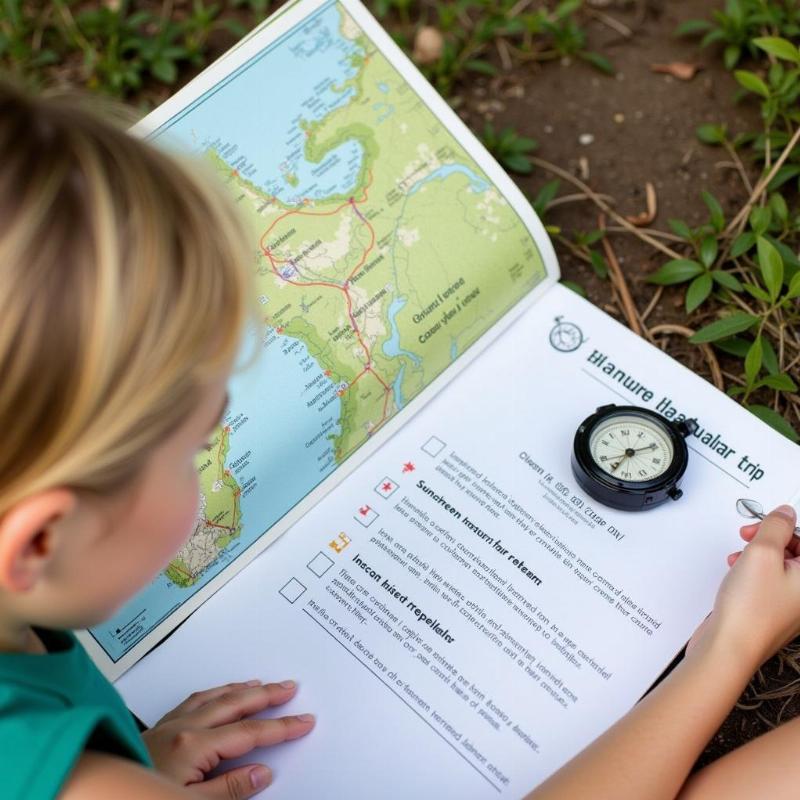Nature tourism, also known as ecotourism, is about connecting with the natural world. It involves travelling to natural areas, appreciating the environment, and contributing to its conservation. Think breathtaking landscapes, diverse wildlife, and immersing yourself in the beauty of Mother Earth. But it’s more than just sightseeing; it’s about responsible travel that benefits both the environment and local communities.
Exploring the Essence of Nature Tourism
Nature tourism is experiencing the outdoors responsibly. It’s about minimizing your impact, respecting local cultures, and supporting conservation efforts. Imagine trekking through a lush forest, kayaking down a pristine river, or birdwatching in a vibrant national park. These activities allow you to connect with nature on a deeper level, fostering appreciation and understanding. Unlike traditional tourism, nature tourism focuses on sustainability and leaving a positive footprint.
Why is Nature Tourism Important?
Nature tourism plays a crucial role in protecting our planet. By supporting eco-friendly initiatives, you contribute directly to the preservation of natural habitats and wildlife. It also empowers local communities by creating economic opportunities that are tied to conservation. Choosing a nature tourism experience often means choosing to support local businesses, promoting sustainable development, and preserving cultural heritage. This type of tourism fosters a deeper understanding of the interconnectedness of ecosystems and the importance of biodiversity.
Different Forms of Nature Tourism
Nature tourism encompasses a wide range of activities, catering to different interests and fitness levels. From gentle nature walks to challenging mountain climbs, there’s something for everyone. Here are some popular examples:
- Wildlife viewing: Spotting tigers in Ranthambore or elephants in Kaziranga.
- Birdwatching: Observing the colourful avian diversity of Bharatpur Bird Sanctuary.
- Hiking and trekking: Exploring the scenic trails of the Himalayas.
- Kayaking and canoeing: Navigating the serene backwaters of Kerala.
- Camping: Spending a night under the stars in a national park.
How to Choose a Responsible Nature Tourism Operator
Selecting the right tour operator is crucial for a fulfilling and ethical experience. Look for operators who prioritize sustainability, have a strong commitment to conservation, and respect local communities. Check for certifications and reviews that validate their eco-friendly practices. For example, you can consider eco-tourism options like the wayanad eco tourism or the agoratoli eco tourism resort.
Planning Your Nature Tourism Adventure
Planning ahead ensures a smooth and enjoyable experience. Research your destination, pack appropriately, and be mindful of local customs and regulations. Remember to pack light, carry reusable water bottles, and minimize your use of plastic. Be prepared for varying weather conditions and carry essential safety gear.
 Planning a Nature Trip
Planning a Nature Trip
Nature Tourism: A Journey of Discovery and Responsibility
Nature tourism offers a unique opportunity to connect with the natural world while contributing to its preservation. It’s a journey of discovery, learning, and appreciation, where you gain a deeper understanding of our planet and our role in protecting it. By choosing responsible nature tourism, you’re not just taking a vacation; you’re making a difference. Consider visiting destinations like the konni adavi eco tourism or the sahyadri eco agro tourism tapola for an immersive experience.
Conclusion
Nature tourism is a powerful way to experience the beauty of our planet while contributing to its well-being. By making conscious choices and supporting responsible operators, we can ensure that future generations can also enjoy the wonders of nature. Remember, nature tourism is not just about what you take away from the experience; it’s about what you give back.
FAQ
-
What is the difference between nature tourism and ecotourism? While often used interchangeably, ecotourism is generally considered a more specific form of nature tourism, with a stronger emphasis on conservation and benefiting local communities.
-
How can I minimize my impact when travelling to natural areas? Pack out all trash, stay on designated trails, respect wildlife, and support local businesses.
-
What are some essential items to pack for a nature tourism trip? Comfortable hiking shoes, insect repellent, sunscreen, a reusable water bottle, a first-aid kit, and appropriate clothing for varying weather conditions.
-
How can I find responsible nature tourism operators? Look for certifications, read reviews, and research their commitment to sustainability and community involvement.
-
Why is supporting local communities important in nature tourism? It helps create economic opportunities tied to conservation, preserving cultural heritage and promoting sustainable development.
PlaToVi is your trusted partner in crafting unforgettable travel experiences, specializing in traditional tour packages, hotel and resort bookings, international and domestic flight reservations, event planning, car rentals, and visa assistance. Whether you are looking for a serene escape in nature or a bustling city adventure, we cater to every travel need. Discover the magic of India with our curated tours, like exploring the historical charm of Orchha with our mp tourism hotel in orchha package. Connect with us today at [email protected] or +91 22-2517-3581 to plan your next adventure. Let PlaToVi turn your travel dreams into reality!